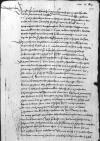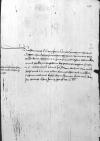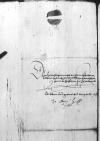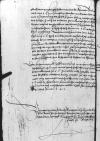List #5000
Albrecht I von Hohenzollern-Ansbach do Ioannes DANTISCUSKönigsberg (Królewiec), 1540-05-25
| odebrano Heilsberg (Lidzbark Warmiński), 1540-05-30 Rękopiśmienne podstawy źródłowe:
Pomocnicze podstawy źródłowe:
Publikacje:
| ||||||||||
Tekst + aparat krytyczny + komentarz Zwykły tekst Tekst + komentarz Tekst + aparat krytyczny
Dem erwirdigenn in Got unnserm besondernn liebenn freundt unnd nachbarn, herrn
Unnser freuntlich dinst zuvornn.
Erwirdiger in Gott besonder lieber freunt und nachbar.
Wir habenn Euer Lieb zweÿ schreibenn, cf.
Dieweil dann Euer Lieb inn iren itzigen schreiben nachmhals von nutz unnd gerathenn ansicht das die schiffarth eynn zeitlang angehaltenn werde / mit anhaft wir Euer Lieb die zeit wan sie frey gelassen werden solte vormeltenn wolten etc., konnenn wir Euer Lieb nit vorhaltenn, / das wir wie auch vorig unnser schreibenn mitbringet, / keÿnn kornn, gerstenn oder habernn dis jar auszustattenn mit Euer Lieb rath und gutbeduncken bedacht sein, / es wher dan sach / das ihemands khornn / aus
Damit auch Euer Lieb undterthan inn irer narung hierinn nit behindert sunder dieselb gleich denn unnserigen habenn und treiben khonnen. / Und wiwol wir Euer Lieb inn jungstem schreiben umb irenn rat / w[ie] mit ausstatung des schifs so zum
Datum
Vonn Gotts gnaden
Postscript:
Nachdem auch Euer Lieb unnserm camerjungenn eynenn clepper ahnn unns zureithenn gelihenn, / thun wir uns desselbenn gegenn Euer Lieb zum freuntlichsten bedancken unnd schickenn denselbenn bey gegenwertigem zeiger Euer Lieb widerumb hiemit zu [w]elcher auch bevelich den [u]nsern wider alher zu [b]ringen. Worinn wir auch solchs umb Euer Lieb mit allem freuntlichem und nachbarlichenn willenn beschuldenn konnen seint wir iderzeit geneigt.
Datum



